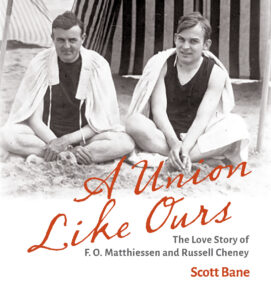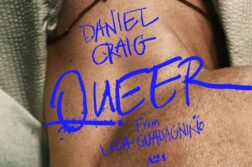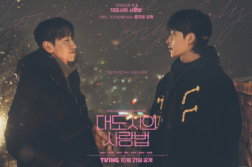
Ever since high school, the desire to write had been buzzing around my head like a mosquito. I tried to swat it away, but it always kept coming back. Although I didn’t know it, what I was missing was a subject to write about. That subject arrived unexpectedly in 2003, in a book review in the New York Times of The Crimson Letter, a book about gay men at Harvard, which introduced me to F. O. Matthiessen, a founding member of Harvard’s then-budding history and literature department, and his life partner, Russell Cheney, a painter. In some ways I’m an unlikely candidate to tell Matthiessen and Cheney’s story, both born with proverbial silver spoons, while I’m from a far more modest middle-class background. My connection to Matthiessen and Cheney came through my sexuality, their relationship, Maine, and Matthiessen’s chosen field of study: history and literature.
I grew up in York, the next town over from Kittery, Maine, where Matthiessen and Cheney owned a house and lived from 1930 until Matthiessen’s death in 1950. (Cheney died in Kittery in 1945.) As I describe in the book I wrote about their lives, A Union Like Ours: The Love Story of F. O. Matthiessen and Russell Cheney, Kittery was their one true home together as a couple. Twenty years separated Matthiessen and Cheney, while fifteen years separates my husband, David, and me. As I read Rat & the Devil: Journal Letters of F.O. Matthiessen and Russell Cheney, an edited volume of Matthiessen and Cheney’s roughly 3,000 letters exchanged with each other, I was astounded to read sentences like the following, which appeared in a September 1924 letter from Matthiessen to Cheney: “Marriage! What a strange word to be applied to two men! Can’t you hear the hell-hounds of society baying full pursuit behind us? … In the eyes of the knowing world we would be pariahs, outlaws, degenerates.”
Prior to learning about Matthiessen and Cheney, I joked that I was the only gay person from Maine. This, of course, wasn’t true, but that was how I often felt growing up. I immediately felt a kinship with Matthiessen, when, for example, he was having difficulty delivering his lectures. He visited a professor of public speaking, who told him that his way of speaking “tends to be blurred and soft.” Matthiessen wondered in a letter to Cheney: “Does it? Am I just like any fairy?” Reading that passage, I was right back in the seventh grade—puberty in full-throttle–when giving a campaign speech for student council to my junior high school and my voice cracked high. My classmates roared with laughter, and like Matthiessen, I too worried that I sounded gay.
As I kept reading about the two men, familiar references piled up like pine needles on the forest floor. In 1932, Cheney landed in Portsmouth Hospital in New Hampshire directly across the Maine border from Kittery to have an appendectomy. This was the same hospital at which I was born 35 years later. On another occasion, Cheney described stopping for dinner Jarvis Cafeteria in downtown Portsmouth. Jarvis’ was still in business when I was a boy, and I can vaguely remember sitting on one of the swiveling stools at the U-shaped counter. Cheney’s paintings of the area also were especially evocative: the United Methodist Church in York with its unmistakable bell-shaped cupola and the many historic houses in the region. The overlaps between my life and theirs captured my imagination, and revisiting the familiar locales of my youth as an out gay man gave me a kind of ownership of the place that I never possessed.
I also felt a connection to Matthiessen’s work. He helped me answer a question, one of those intensely personal questions that only you know, if you can even articulate it to yourself. In 1993, I graduated from Hunter College, which is part of the City University of New York. After graduation, I did what many an English major before me has done: I applied to graduate school in English. My heart wasn’t really in it, but I didn’t know what else to do, so I followed through with that path. As part of my applications, I was required to submit a personal essay describing my prospective research interests. I couldn’t do it. I couldn’t say what I was most interested in at the time because I didn’t know, despite having graduated as a double major, summa cum laude.
The answer came to me a decade later, when I discovered Matthiessen’s work. As I write in the Prologue to A Union Like Ours: “Matthiessen wrote the kind of cultural history that I had liked so much during college, analyzing literature as art but also considering it as a historical index that can reveal something about the time and place in which it was created.” History and literature, the very concentration that Matthiessen had developed at Harvard and would later grow into American Studies, had been what I was most interested in during college, but I didn’t have language for this until I stumbled upon Matthiessen’s work. I also liked that despite having spent his entire professional life within the academy, Matthiessen was very skeptical about it: “One little piddling article leads to another: Had Bacon read Montaigne? Where was Florio in 1583? And to think that there are thousands of such volumes being manufactured every year. Every time I come into contact with this so-called scholarship it makes me very grave: for with such sand slowly piling up how long is it going to be before the house is entirely covered?”
As I say at the end of A Union Like Ours: Matthiessen and Cheney gave me a gift in having an opportunity to write about their love for each other and life together in greater detail and with more nuance than anyone else has done to date, and I was finally able to quell – at least temporarily – the pesky and insistent desire to write.
 Scott Bane’s double biography A Union Like Ours: The Love Story of F.O. Matthiessen and Russell Cheney (Bright Leaf/University of Massachusetts Press, 2022) was a finalist for the 2023 Randy Shilts Award for Gay Nonfiction. Scott’s other writing has appeared in The Boston Globe, The Huffington Post, The Gay & Lesbian Review, Down East Magazine, and Poets & Writers Magazine among others. Scott lives in New York City with his husband, David W. Dunlap. You can learn more about Scott and his work on his website.
Scott Bane’s double biography A Union Like Ours: The Love Story of F.O. Matthiessen and Russell Cheney (Bright Leaf/University of Massachusetts Press, 2022) was a finalist for the 2023 Randy Shilts Award for Gay Nonfiction. Scott’s other writing has appeared in The Boston Globe, The Huffington Post, The Gay & Lesbian Review, Down East Magazine, and Poets & Writers Magazine among others. Scott lives in New York City with his husband, David W. Dunlap. You can learn more about Scott and his work on his website.






